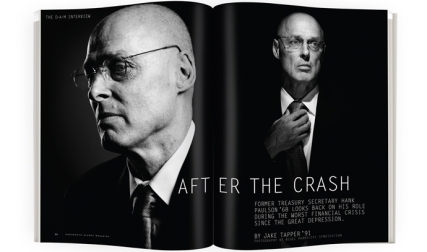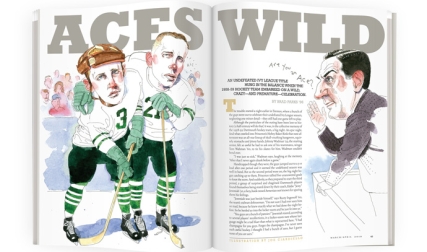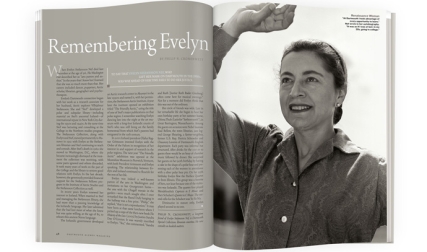In November 2009 four members of the class of 1966 walked into the Canoe Club restaurant on Main Street in Hanover looking for owner John Chapin. They’d had a class vote—and decided to adopt him as a member.
Chapin opened the Canoe Club in late 2003 and has since filled its walls with Dartmouth ephemera: a 1952 Winter Carnival Poster, turn-of-the-century copper plate class prints and an original graduation invitation, with envelope, for the class of 1884, among others. He’s also become close with local alums, including Chuck Sherman ’66, with whom he plays poker. And he’s joined a local committee of citizens dedicated to raising money for the Hopkins Center.
In spite of Chapin’s increasing involvement with the College community, he had no idea what the four class of 1966ers were talking about.
The punch line to this four-men-walk-into-a-bar joke is that it was the first Chapin had even heard of Dartmouth’s adoption practice. The alums didn’t ask in advance if he was interested in joining their class. They just announced to him that he was in.
“I’m not sure of the mechanics of it—maybe they’d all had an extra glass of wine—but they decided it’d be a great idea to have me as an honorary class member,” Chapin says. “I have to admit—it was around 5 o’clock, and I was preparing for the dinner rush—it wasn’t until about an hour after they left that I even thought about what they said. It was so out of context.”
In joining the class of 1966 Chapin became one of the 156 living Dartmouth alumni who did not actually matriculate at the College. He and his fellow adopted alums receive no real Dartmouth diplomas, nor do they walk with their respective classes at graduation. The majority never took even a single course at Dartmouth, n0n-recording option or otherwise. Yet they attend reunions and receive class mailings and DAM. Sixty-seven percent of living adopted alums have contributed at least once to the Dartmouth College Fund, and many pay class dues. Within a month of his initiation, for example, Chapin had already been solicited for, and paid, his dues. “I’ll pay of course, now that I’m a member of the class and live in the Upper Valley. I just made it clear to them—no free meals, guys!” he says.
Chapin admits to feeling surprised at the decision to adopt, of all people, him. “You’d think that an honorary class member would need a Nobel or Pulitzer for consideration,” he says. Although that may be the case for most honorary degree recipients, adopted alumni are a different story altogether.
Upon graduation most classes draft a constitution to obtain nonprofit tax status. Each constitution includes a membership clause. Patricia Fisher ’81, director of class activities for alumni affairs, offers a succinct explanation: “If a class feels strong ties to a particular person or wants to make sure that a new faculty member or administrator feels welcome, it can choose to extend an invitation.” With 13, the class of 1971 claims the most adopted members, followed by the class of 1969 with 12. The College’s only rule: No one can be officially adopted by more than one class.
As simple as the process sounds, there is no uniformity—not because the procedure varies from class to class, but rather because it varies according to personal relationships, motivations, affiliations and connections within each class.
Example 1: Dale Benoit A’68, who worked as legal secretary to Ronald Weiss ’68 during Weiss’s 20-year stint as class treasurer (today Weiss is class president). “I believe Ron let the class officers know that I was the one who took care of many of the treasurer’s tasks,” Benoit says.
Example 2: Nicholas Hagoort Jr. A’53, who became involved with Dartmouth through a labyrinth of fraternization. Try to keep up: He first met Jeff O’Connell ’51 at Harvard Law School. O’Connell introduced Hagoort to David Krivitsky ’51 (whom O’Connell knew through Casque & Gauntlet); Krivitsky introduced Bryan Menides ’53 to Hagoort—his first connection to his future adoptive class. It was through Menides that Hagoort met his close friends, Bob Callendar ’53 and Paul Paganucci ’53, with whom he lived for several years in New York City in the 1960s. Bob and “Pags,” as Hagoort fondly remembers them, were ultimately responsible for his official adoption into the class at his 40th birthday party.
Several adoptees are former and current College administrators, including former Dean of the College Tom Crady A’76 and his predecessors Lee Pelton A’58 and Thaddeus Seymour A’49. Former president Jim Wright belongs to the class of ’64, the late James Freedman was an A’57. When Jim Kim was announced as the new president last year, three classes immediately contacted Fisher about his membership. From the classes of 1999, 1981 and 1982 he chose 1982—his graduation year from Brown.
The class of 1966 also inquired about adopting Kim, but not until his acceptance of the 1982 offer was already final. “I was told he chose a class closer in age to his own,” says Sherman.
Other adoptees are widows—April Foley A’69, until last April the U.S. ambassador to Hungary, was asked to join the class of 1969 several years after her husband, Giff Foley ’69, died in a plane crash at 45. “I attended the 25th reunion and had a wonderful time hearing ‘old Giff stories’ and seeing some of my late husband’s fabulous friends,” she says.
Some adoptees are fundraisers, such as Cornelia Purcell A’80, who worked for months to help the class of 1980 raise money for its 20th reunion.
Some are coaches (baseball coach Bob Whalen A’79), some are professors (John Rassias A’76 and A’49, who somehow managed to thwart the one-class-only rule), some are former exchange students (Nanalee Raphael A’69 and Masachika Onodera A’58).
It could be said that being adopted is all about whom you know—or sometimes being completely unaware of the process. One of the women from the early 1970s exchange programs, who declined to be quoted for this story, didn’t even realize she’d been adopted until asked how her adoption has affected her. She wished she known sooner, she joked, because maybe then her daughter would have been accepted by the College.
It’s surely about being on the radar of one of those special alums who bleeds Dartmouth green, possesses greater-than-average knowledge about Dartmouth alumni adoption practices, and thinks of classmates as family, Hanover as home base and class membership as a true privilege.
“Adoption is a way for a class to bestow special recognition upon someone who’s deserving of honor for meeting the standards that your class sets,” explains Bill Mitchell ’79, current class vice president and the man who spearheaded the recent adoption of Coach Whalen. (A bit about the process: “I came up with the idea to adopt Bob and talked about it with a number of class officers and a number of folks who were influential in our class,” Mitchell says. “We all thought Bob would be a perfect person to adopt. Now he’s included in all our class mailings, and he’s a regular at class activities.”)
“Adoption is a great way to express appreciation to people who have done a lot for your class,” says Rex Morey ’99. As his class president since 2008 he has urged the adoption of three class deans: Carolynne Krusi A’99, Sylvia Langford A’99 and Katherine Burke A’99. “It’s an honor,” he explains.
The claim is easy to understand coming from someone so invested in his class. But adoptees also echo the sentiment, regardless of their level of exposure to the College and how much time they’ve actually spent in Hanover.
Chapin jokes that if they’d asked his permission, he might have requested membership with the class of 1976 instead—the difference of decades would make him sound younger. But in spite of his covert adoption, he, too, says he appreciates the gesture.
“I already live in the heart of Dartmouth and work across the street from the College, so I enjoy feeling like a slightly more authentic part of the Dartmouth fabric,” he says.
One final heart-warming example: Matthew Marshall A’45, manager of the Hanover Inn for 23 years, says that his adoption makes him feel especially connected. “Being adopted by the greatest generation is very special,” he says. “These guys have seen it all and done it all, but if you attended one of their lunches you would know they aren’t done yet!”
Just how unique is this Dartmouth tradition? Though it isn’t the only college to offer honorary class memberships (Seymour A’49 is also an honorary member of the class of 1978 at Wabash and the class of 1982 at Rollins, for example), Dartmouth is one of the few that refers to the process as an adoption. The title fits. Whether a class wants to extend membership out of gratitude, friendship or simply as a means of helping a newcomer feel more included, the underlying message is consistent: We are family, and so are you.
Carolyn Kylstra, a former DAM intern, is a columnist for Men’s Health magazine.



